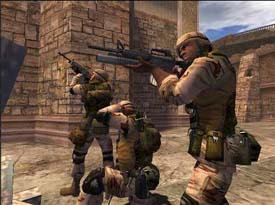
NEW YORK (CNN/Money) � Imagine an industry where your most loyal customers are also your biggest detractors. They can be abusive, demanding and are almost always impossible to please, yet without their blessing, you're as good as doomed.
Welcome to the gaming world.
Hardcore gamers only make up between 20-25 percent of the industry's annual software sales, but the buzz enthusiasts create can turn a moderate hit into a monster.
"If you can tap into a vein of interest that they have, then you've got a high probability of having a commercial success on your hands," said John Taylor, an analyst with Arcadia Research. "And if that spills into the mass market, then you've got an overwhelming success."
Need proof? Look no further than "Grand Theft Auto III". When Take Two (TTWO: Research, Estimates)'s game came on the scene, with a revolutionary style of play, core gamers liked what they saw � and they began talking. Before long, it was readily apparent that casual gamers were listening.
"When 'Grand Theft Auto III' was originally released, no one had any idea it was going to be near as large as it was," said Taylor. "It took six to eight weeks before people realized something unusual was happening and that there was crossover appeal to that game."
To date, "Grand Theft Auto III" has sold more than 10.5 million copies.
Traditionally, as the gaming industry enters the back half of a console generation, publisher focus shifts to the mass market. But things appear to be different this cycle. While they're hardly neglecting the mass audience, major publishers are also redoubling efforts to appeal to enthusiasts.
 |
|
| THQ is targeting a different audience with 'Full Spectrum Warrior' |
THQ (THQI: Research, Estimates) is the latest to reach out. "Full Spectrum Warrior," a tactical military action game released earlier this week, is a significant departure from the company's traditional line of family-friendly games, such as "Finding Nemo" and "SpongeBob Squarepants".
Later this year, THQ will release "Warhammer 40,000: Dawn of War," a strategy game set in a violent, post-apocalyptic world and the first person shooter "S.T.A.L.K.E.R.: Shadow of Chernobyl".
"We see this as just an expansion," THQ president and CEO Brian Farrell told me. "A lot of hardware is sold sub-$149. We feel we already own that consumer. ... Our strategy is to attack the core gamer aggressively."
Electronic Arts (ERTS: Research, Estimates) seems to be making a greater effort to turn enthusiast heads as well. Since 1996, the company has only released a dozen titles that earned an M (or Mature) rating � publishing none since early 2002. That run will likely end later this year with the release of "Def Jam: Fight for NY," a hip-hop flavored fighting game.
M-rated games typically appeal more to hardcore gamers than a mass audience. And EA's renewed interest in them doesn't stop with "Def Jam". The company has several other M-rated titles in the works, according to Bruce McMillan, executive vice president and general manager of EA's worldwide studios.
"You're going to see more M-rated games in our future," he said. "We have the infrastructure in place and we're going to walk very slowly into the arena. ... [but] we're not going to get into gratuitous sex or violence."
There are smaller publishers, which cater almost exclusively to the hardcore crowd. Similarly, some of the industry's biggest developers make a distinct effort to establish relations with enthusiasts. Valve Software (makers of "Half-Life") and Epic Games (which created the "Unreal" franchise), for example, both work closely with their most enthusiastic fans, helping them create mods � or user-made add-ons to a game.
id Software may take the prize for community relations, though. The team behind the "Doom" and "Quake" series holds a free, annual gathering called "QuakeCon" for its fans, who are almost exclusively hardcore gamers. Last year, 4,000 of those fans turned out for the event and even more are expected this year. (It took less than six minutes for 1,000 hardcore gamers to register for QuakeCon 2004.)
QuakeCon is a mecca for the hardcore, with a 24-hour gaming room, big money tournaments, workshops and parties. The highlight for fans, though, is a session with id's developers, who answer questions and often show clips from forthcoming games.

| |
|
More gaming news and commentary? Click above.
|
|
For the last few years, those clips have been of "Doom 3," which is nearing completion after a four-year development cycle. This year, most fans were hoping to get their first glimpse of "Quake 4," which is being developed (under id's supervision) by Raven Software. Unfortunately, they're going to have to keep waiting. id CEO Todd Hollenshead said there are no plans to show the game at this year's QuakeCon.
"We've been happy with what they've done, but it's too early to show," added id's lead designer Tim Willits.
The disappointment of not seeing the game could bring out the ugly side of the hardcore crowd, though. Hollenshead said it comes with the territory.
"The guys who love you the most are also the people who will blast you the hardest if you piss them off," he said. "We've been trying not to whip people into a frenzy with ['Quake 4']. When we show the game, we want it to be something that's really impressive for the people who have been waiting for it."

Morris is Director of Content Development for CNN/Money. Click here to send him an email.
|

